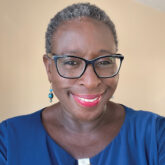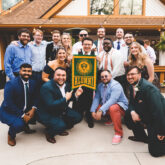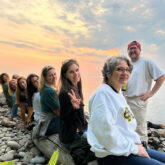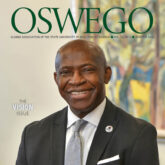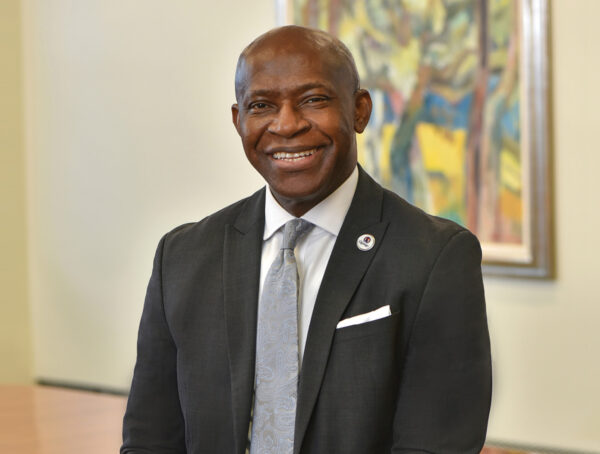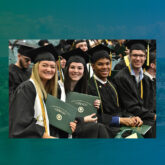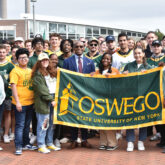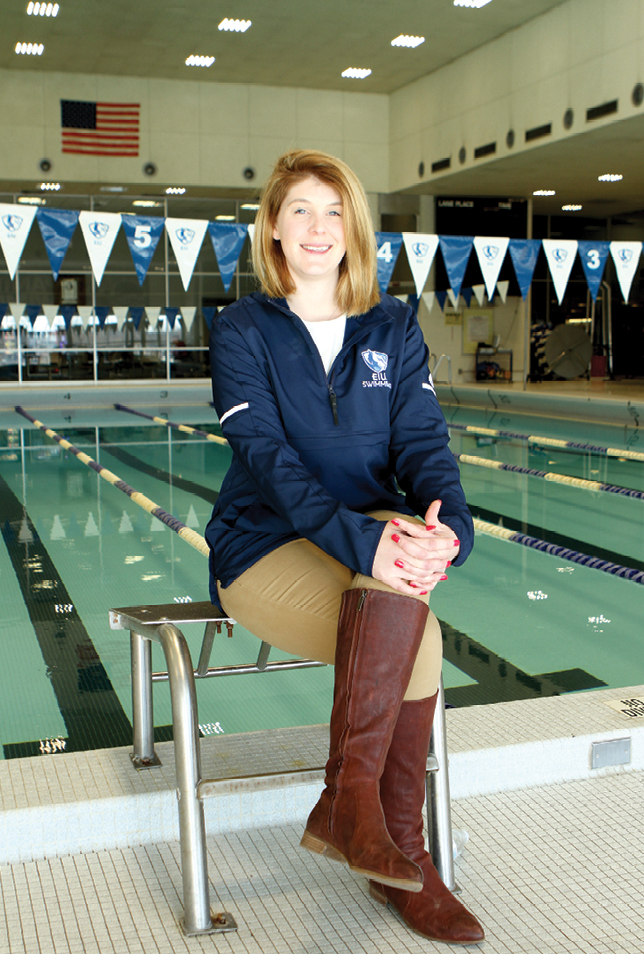
Jacqueline Michalski ’10
She used to beat the boys. Now she’s coaching them.
“I’m on deck every day for that little girl who fell in love with the water,” said Jacqueline Michalski ’10, speaking of her own childhood as a competitive swimmer who transitioned her love of the sport into a four-year stint on the SUNY Oswego women’s swim team—helping the team win the SUNYAC Conference Championship in 2007.
Today, Michalski is at the helm of NCAA Division I men’s and women’s swim programs as the head coach of Eastern Illinois University, a role she has held since August 2014.
It’s a rare coaching gig: According to the NCAA, only around 3 percent of NCAA men’s teams are led by women; just 40 percent of women’s teams have a female head coach.
Michalski, who is originally from Chenango Forks, N.Y., has led the Panthers to new school records, designation as a College Swimming Coaches Association of America Scholar All-American Team, and in its most recent season, 32 top-16 finishes at the Summit League Championships.
“I know my four years spent in Laker Hall made me into the successful coach that I am today,” Michalski said. It wasn’t just the competition that propelled her, it was the camaraderie, great training partners and great friends, she said.
“The men’s and women’s teams acted very much as one, always motivating and encouraging others to succeed, despite gender,” Michalski said. “I took this team atmosphere, which I learned from Oswego, and carried it into my daily coaching life here at EIU. The men’s and women’s teams at times have combined practices, and work together as a unit to make each other better.”
Read the full interview with EIU Head Swim Coach Jacqueline Michalski
From Doer to Teacher
In the high-scrutiny, travel-heavy, around-the-clock lifestyle of NCAA collegiate coaching, discipline and determination are key. Those are traits that former NCAA athletes have in spades; they spend their collegiate careers maintaining the focus and strength to compete at NCAA standards. In fact, Michalski is one of many former SUNY Oswego NCAA student-athletes who have leveraged lessons learned in the pool—or on the field, court and ice—to careers shaping programs and students at the elite level of play.
Take Joe Jones ’87 M’89, who transitioned from the Laker Hall basketball court to a Boston University head coach job, a position he’s held since the 2011-2012 season. Before becoming head coach, he was associate head coach for the Terriers and held coaching roles at Columbia, Villanova and Hofstra.
And one of Oswego State’s signature athletics programs—ice hockey—has had a number of student-athletes turned coaches, including T.J. Manastersky ’06, a Laker defenseman who went pro following graduation. Manastersky is now in his sixth season as the head coach of Curry College in Milton, Mass. It’s a role he has prepared for since childhood; he grew up in a coach’s office because his father was a collegiate hockey coach for York University.
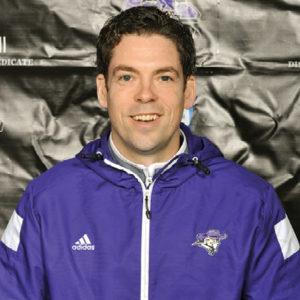
T.J. Manastersky ’06
“I always knew that I wanted to be a coach when I finished playing,” said Manastersky, who is married to Oswego alumna Lindsay Gauthier Manastersky ’05; the couple have a son, Wesley Pierson, Oswego Class of 2039. “D3 hockey is so good, so competitive, and has so many great coaches working hard to be successful that I am fortunate to be a part of that group.”
Manastersky has fond memories of the ice hockey rivalry with Plattsburgh, and the bagel and tennis ball toss—which, he said, remain a truly unique tradition in sports. But it was the people and the lessons learned on the ice that stick with him as head coach today, he said.
“I learned how important it is to effectively communicate with your players,” Manastersky said. “It is a partnership.”
There’s also Jamie Dumont ’98, an impact player during his ice hockey career at Oswego State, who went on to assist the Laker coaching staff as a volunteer, leading Oswego into the NCAA tournament in 1998. Following his time in Oswego, he got his first taste of upper-level head coaching experience with the Italian Professional League’s Bolzano Hockey Club and the Dutch Premier League.
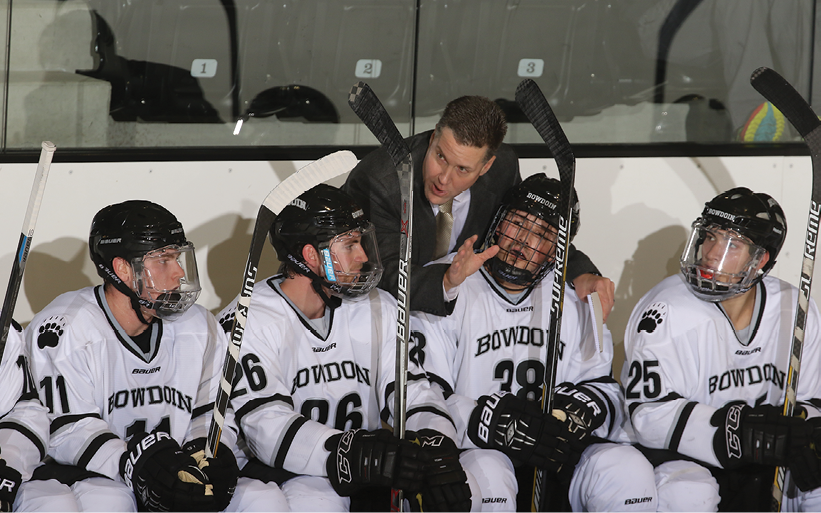
Jamie Dumont ’98
Dumont returned to his home state of Maine in fall 2011, and has been with the coaching staff of the Bowdoin College program ever since. He was named its head coach in 2016. Since Dumont’s return, the Polar Bears have won 83 games en route to two NESCAC Championships in a five-year span.
Back in 1998 when he volunteered at Oswego, it was the high level of responsibility afforded by then Head Coach George Roll and then Assistant Coach Ed Gosek ’83 M’01 that started Dumont on the path to coaching, he said.
“I was so fortunate,” Dumont said. “Oswego State was so good to me, and that stays in your heart.”
Dumont, who played at Romney Field House as a student, returned to campus with his Bowdoin team in 2014 as part of first round action in the NCAA Division III Men’s Ice Hockey Championship that season.
“The new [Marano Campus Center] rink is beautiful,” Dumont said. “That’s something that’s special about Oswego—how it feels about its program, and how the students and the town support it. It’s a great environment.”
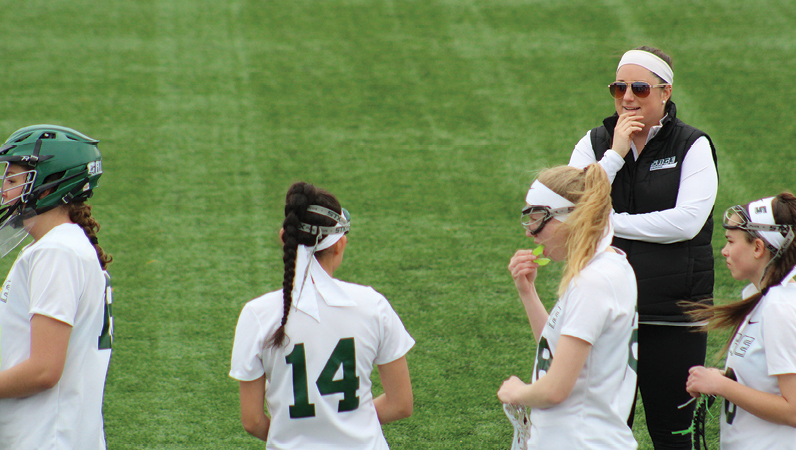
Lauren Marois ’13
Just down the New York State Thruway—and a few hours drive east of the LeMoyne College (Syracuse) women’s lacrosse program headed by Kathy Taylor M’11—is the Sage Colleges, where the women’s lacrosse team is run by Lauren Marois ’13. Under Marois’s direction, the 2017 team enjoyed the most successful season in the program’s nine-year history that wrapped with the team garnering its first post-season appearance. Marois, who has been with the program for five years, including two years as head coach, brought her young team to compete for the first time in school history against her alma mater in March 2017.
“We had Sub Shop on Bridge Street, and I got to show them Oswego—a piece of my life,” Marois said. It was a life where the lacrosse goalie—who entered Oswego as an undeclared major (“All I knew was that I wanted to play lacrosse”)—gained valuable skills that shaped her coaching style.
“I learned a lot of my values at Oswego,” Marois said. “I also can tell my students: I’ve been there, too. I did it for four years; I can help you. I want them to know academics comes first; they are here for an education. I was taught that at Oswego.”
In addition to her title as head coach, Marois is the Sage Colleges assistant sports information director, and plans to pursue an advanced degree in athletics administration.
“Athletics has been such a huge part of my life,” said Marois, who said the friendships she forged as an Oswego player are still her closest. “I think for a lot of us, after four years of being a college athlete, you just aren’t ready to give it up.”
Starting New Programs
Alumni aren’t just carrying on traditions of college team successes all over the country; they have been instrumental in starting—and restarting—programs, too.
There hadn’t been a baseball game played at Bard College in Annandale-on-Hudson, N.Y., in more than 75 years, until Andy Salvatore ’11 restarted the program in 2013. The donation of a turf facility prompted Bard to bring baseball back, and Salvatore, who took on the head coach role for Bard after a few years as assistant coach at Oswego State, jumped at the opportunity.
“I’m lucky to be able to call it ‘work’ everyday,” Salvatore said. “I liked the idea of recruiting nationally, which Bard definitely offers.”
After going 0-20-1 in conference play in 2014—Bard’s first year in the Liberty League, the young team has begun racking up a double-digit tally’s worth of league wins. Several players have won All-Liberty League awards and the 2017 roster reached 35 players, which is on par with other teams in the league.
“It has been a chance to start from the ground up, and we are well on our way to building something special,” Salvatore said.
Other collegiate program builders include golfer Steve Serling ’77, who earned 1975 NCAA Championship Honorable Mention All-America accolades for Oswego, as the Lakers finished 12th in the nation that year. Serling was part of three-straight SUNYAC golf titles on behalf of Oswego. He eventually helped launch the women’s golf program at LeMoyne College in 2010, as the Dolphins’ first head coach. In 2015, his final season at Le Moyne before retiring, Serling was named Northeast-10 Conference Coach of the Year.
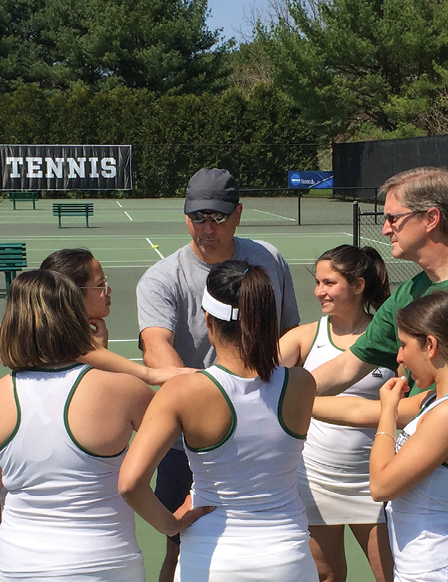
Adam Waterhouse ’84
Adam Waterhouse ’84, who co-captained the Oswego State tennis team in 1983-1984, also built a collegiate program from scratch.
Farmingdale State, on New York’s Long Island, hired Waterhouse in the fall of 2006 to develop both its men’s and women’s tennis programs. In their first season, he led the women to a 4-5 record and the men to a 5-7 record, with both teams making appearances in the Conference Tournament.
For Waterhouse, “the transition from player to coach happened slowly over time.”
“I initially became a part-time teaching professional and discovered that I enjoyed teaching the game to kids,” Waterhouse said.
The Plainedge High School biology teacher coached high school teams for almost 20 years before the college opportunity became available; as a collegiate coach, he has earned Skyline Conference Coach of the Year honors six times.
“Playing tennis at SUNY Oswego was an amazing experience,” said Waterhouse, who has three children with his wife, Denise Weimer Waterhouse ’83. “The most important lesson that I learned as an athlete was what it takes to be a respected and inspiring coach. Coach John Glinski led by example and I think of him often when I am on the courts with my own players. He treated me with kindness, respect, and was not afraid to let me know when I needed to work harder. I am the coach I am today in large part because of him.”
It’s a common thread among yesterday’s athletes who are today’s coaches: Appreciation for the Oswego State coaches who taught them.
Life Lessons
Back in the pool at EIU, Michalski puts her team through timed drills. She shouts encouragement. She shares her keen knowledge and competitiveness with her team—qualities that help them take on the challenges of not just the swimming pool, but of life itself, too.
“Many define a successful coach by the record board or by the win-loss column,” Michalski said. “I define a successful coach by how well the athletes do through their journey through college and beyond. I believe my job is to set the bar high in all areas: academic, athletics and life. This sets a foundation for years well beyond college.
Athletic Coaching Minor
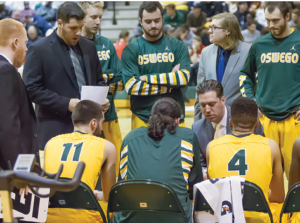 While alumni serve as collegiate coaches both at home and around the nation, the college has a minor to train coaching staff at the high school level. The athletic coaching minor is designed for students who wish to coach in New York State secondary schools (grades 7-12). Coursework extends beyond the credits required for the New York State Temporary Coaching License. These Oswego State-trained future coaches are preparing high school students to be the next athletes on the NCAA stage.
While alumni serve as collegiate coaches both at home and around the nation, the college has a minor to train coaching staff at the high school level. The athletic coaching minor is designed for students who wish to coach in New York State secondary schools (grades 7-12). Coursework extends beyond the credits required for the New York State Temporary Coaching License. These Oswego State-trained future coaches are preparing high school students to be the next athletes on the NCAA stage.
Learn more about the program at oswego.edu/health-promotion-and-wellness/athletic-coaching.
Read the full interview with EIU Head Swim Coach Jacqueline Michalski
More from Featured Content
Vision for the Future
VISION for the Future Peter O. Nwosu began his tenure as the 11th president of SUNY Oswego, building on the solid …
Envisioning the Potential in All Students
ENVISIONING the Potential in All Students Educator donates $2 million in recognition of his Oswego education, in support of future teachers Frank …
A Vision of Support
A VISION of Support Award-winning principal makes an impact on her school through her positivity and commitment When Nicole Knapp Ey ’02 …

